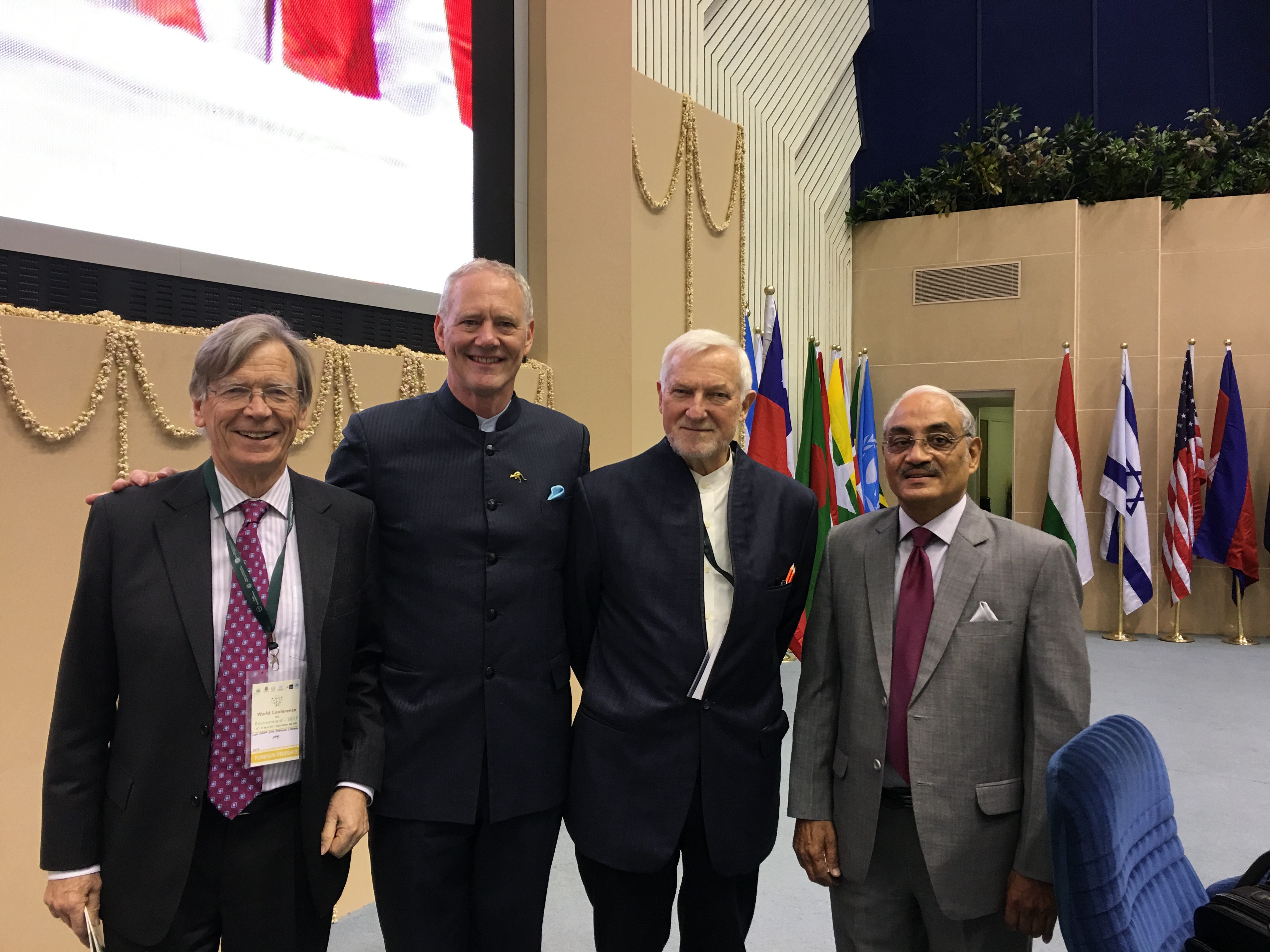
From left to right: Lord Robert Carnwath, Chief Justice, Supreme Court of the United Kingdom, Justice Michael Wilson, Supreme Court of the State of Hawai’i, United States of America, Professor Ben Boer, Research Institute of Environmental Law, Wuhan University, and Justice Swatanter Kumar, Chairperson, National Green Tribunal, India
Ben Boer attends World Conference Environment 2017, New Delhi, India.
Professor Ben Boer of the Research Institute of Environmental Law, School of Law, was invited by the Chairperson of the National Green Tribunal of India to attend the World Conference Environment 2017 in New Delhi on 25 and 26 March.
The President of India, the Chief Justice of the Supreme Court of India and the Attorney General of India, inaugurated the conference. It was attended by a wide range of Indian legislators, together with many Indian judges, scientists, lawyers, academicians and corporate executives in the field of the environment. There was also high-level representation from the Asian Development Bank, the United Nations Environment Program and the IUCN World Commission on Environmental Law. There were also many environmental law students who assisted with the organization of the conference from a variety of all schools around the city of New Delhi.
The National Green Tribunal, which hosted the conference, is a specialised body equipped the expertise to deal with environmental disputes concerning multidisciplinary matters. It was established by the National Green Tribunal Act 2010, independent from the Supreme Court and other courts. It deals with the protection and conservation of natural resources, including forests and water, all kinds of pollution and the assessment and award of damages in relation to persons and property arising out of environmental degradation. Judges of the Tribunal have been appointed all over India. It also has non-judicial expert members to assist in the decision-making on complex scientific and other matters.
Papers of the conference were given on a very wide range of issues, including the law and policy relating to climate change and the Paris agreement, air pollution, water pollution, economics.
Professor Boer’s paper was titled: “Climate Change, Human Rights and the
Principles of the Environmental Rule of Law”. It focused on the links between human rights and climate change, which are being more widely recognised within legal processes around the world. He argued that the newly emerging concept of the Environmental Rule of Law can also promote the links between human rights and climate change. The environmental rule of law and robust institutions are essential to respond to increasing environmental pressures that threaten the ecological integrity of the Earth, in a way that respects fundamental rights and principles of justice and fairness. The environmental rule of law should thus serve as the legal foundation for promoting environmental ethics and achieving environmental justice, global ecological integrity, and a sustainable future for all, including for future generations, at local, national, sub-national, regional, and international levels.
The paper explored the 13 principles associated with the Environmental Rule of Law. These principles are:
Principle 1 Obligation to Protect Nature
Principle 2 Right to Nature and Rights of Nature
Principle 3 Right to Environment.
Each human, present and future, has the right to a safe, clean, healthy, and sustainable environment.
Principle 4 Ecological Sustainability and Resilience
Principle 5 In Dubio Pro Natura
Principle 6 Ecological Functions of Property
Principle 7 Intragenerational Equity
Principle 8 Intergenerational Equity
Principle 9 Gender Equality
Principle 10 Participation of Minority and Vulnerable Groups
Principle 11 Indigenous and Tribal Peoples
Principle 12 Non-regression
Principle 13 Progression
Professor Boer looked in more detail at the Principle of “In dubio pro natura”, a Latin term which means “If in doubt, decide for the environment”. This means that when there is some doubt about the safety or wisdom of a decision about an environment and development issue, in the courts and administrative agencies, the decision must be made to ensure that it is most likely to favour the protection and conservation of the environment. Preference must be given to alternatives that are least harmful to the environment. It also means that actions shall not be undertaken when their potential adverse impacts on the environment are disproportionate or excessive in relation to the benefits derived from the proposed development activity. Professor Boer explored how this principle would affect decision-making concerning matters relating to climate change. He argued also that some fundamental rethinking is needed of the approach by decision-makers about all kinds of development activity that affects the environment.
He concluded that all of these principles mentioned above should be used as the basis of capacity-building programmes as part of the ‘new wave’ of environmental law theory and practice. He also mentioned that the newly established Global Judicial Institute for the environment would be an important way to promote the legal implementation of these principles through the courts.
Translated into Chinese by Ms Yao Congwen, Ph.D student at the Research Institute of Environmental Law, Wuhan University